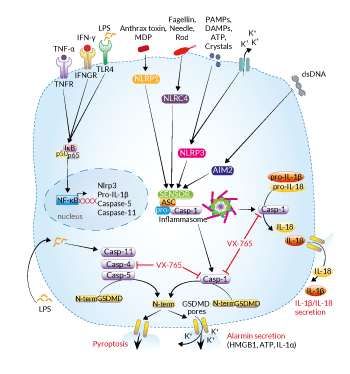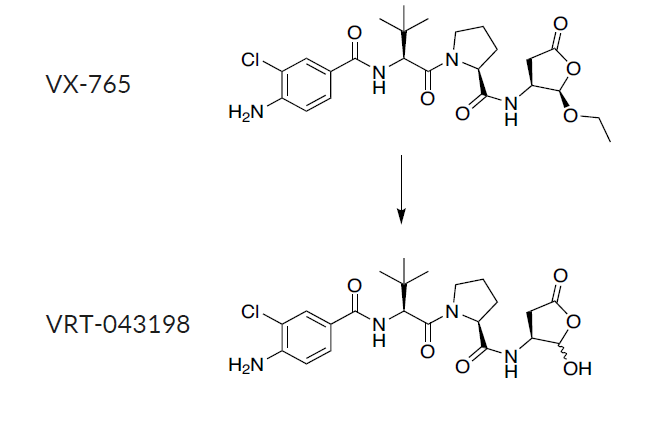Caspase-1 and Caspase-4 inhibitor
| Product | Unit size | Cat. code | Docs. | Qty. | Price | |
|---|---|---|---|---|---|---|
|
VX-765 Caspase-1 and Caspase-4 inhibitor - InvitroFit™ |
Show product |
10 mg 5 x 10 mg |
inh-vx765i-1
|
|
Caspase-1 and Caspase-4 inhibitor

Casp-1 and Casp-4 inhibition by VX-765
VX-765 is a pro-drug converted by plasma esterases into an active peptidomimetic metabolite, VRT-043198, which potently inhibits the enzymes caspase-1 and caspase-4 [1]. Both caspase-1 and caspase-4 belong to a family of inflammatory caspases that are crucial in regulating cell death and inflammation [2, 3].
Mode of action:
VX-765 acts by covalent modification of the catalytic cysteine residue in the active site of caspase-1. Through its inhibitory activity, it has been demonstrated that VX-765 reduces the production of IL-1β and IL-18 in models of inflammatory disease both in vitro and in vivo [1, 4]. In addition, it has been reported that this inhibitor blocks pyroptosis [5].
Key features:
- Upon conversion, a potent inhibitor of caspase-1 and caspase-4
- InvitroFit™ grade: each lot is highly pure (≥97%) and functionally tested
![]() Download our Practical guide on Inflammasomes
Download our Practical guide on Inflammasomes
References:
1. Wannamaker W. et al., 2007. (S)-1-((S)-2-{[1-(4-amino-3-chloro-phenyl)-methanoyl]-amino}-3,3-dimethyl-butanoyl)-pyrrolidine-2-carboxylic acid ((2R,3S)-2-ethoxy-5-oxo-tetrahydro-furan-3-yl)-amide (VX-765), an orally available selective interleukin (IL)-converting enzyme/caspase-1 inhibitor, exhibits potent anti-inflammatory activities by inhibiting the release of IL-1beta and IL-18. J Pharmacol Exp Ther. 321(2):509-16.
2. Van Opdenbosch N. & Lamkanfi M. et al., 2019. Caspases in Cell Death, Inflammation, and Disease. Immunity. 50(6):1352-1364.
3. Tsuchiya K.et al., 2019. Caspase-1 initiates apoptosis in the absence of gasdermin D. Nat Commun. 10(1):2091. 4. McKenzie B.A. et al., 2018. Caspase-1 inhibition prevents glial inflammasome activation and pyroptosis in models of multiple sclerosis. PNAS. 115(26):E6065-E6074.
5. Doitsh G. et al., 2014. Cell death by pyroptosis drives CD4 T-cell depletion in HIV-1 infection. Nature. 505(7484):509-14.
Specifications
CAS number: 273404-37-8
Chemical Name: (S)-1-((S)-2-{[1-(4-amino-3-chloro-phenyl)-methanoyl]-amino}-3,3-dimethyl-butanoyl)-pyrrolidine-2-carboxylic acid ((2R,3S)-2-ethoxy-5-oxo-tetrahydro-furan-3-yl)-amide
Solubility: 100 mg/ml (200 mM) in DMSO or ethanol
Formula: C24H33ClN4O6
Molecular weight: 509 g/mol
Quality control
- Purity: ≥97% (UHPLC)
- The inhibitory activity of the product has been validated in inflammasome cellular assays using THP1-Null2 and HEK-Blue™ IL-1β cells.
- The absence of bacterial contamination (e.g. lipoproteins and endotoxins) has been confirmed using HEK-Blue™ TLR2 and HEK-Blue™ TLR4 cells.
Contents
VX-765 (provided as a translucent film) is available in 2 quantities:
- 10 mg VX-765 (#inh-vx765-1)
- 5 x 10 mg VX-765 (#inh-vx765-5)
![]() VX-765 is shipped at room temperature.
VX-765 is shipped at room temperature.
![]() Upon receipt, store at -20°C.
Upon receipt, store at -20°C.
![]() Resuspended product is stable for at least 6 months when properly stored.
Resuspended product is stable for at least 6 months when properly stored.
![]() Avoid repeated freeze-thaw cycles.
Avoid repeated freeze-thaw cycles.
Details
Caspase-1 & Caspase-4:
Caspases are a family of cysteine proteases that are centrally involved in cell death and inflammatory responses [1, 2].
Notably, caspase-1, also known as interleukin-1 converting enzyme (ICE), plays a crucial role in the control of inflammation. Its activity is regulated by a multi-protein complex known as the inflammasome. Upon activation, caspase-1 processes interleukin-1β (IL-1β) and IL-18, and gasdermin D, promoting inflammation and pyroptosis, a form of cell death [1].
Caspase-4 is a 'non-canonical inflammasome' that senses intracellular lipopolysaccharide (LPS) from Gram-negative bacteria and causes an inflammatory response, independent of TLR4 [3,4]. Caspase-4 cannot cleave pro-IL-1β/pro-IL-18, but instead triggers the cleavage of the pore-forming protein gasdermin D, leading to the release of alarmins and K+ efflux from the cell. This ultimately induces the activation of canonical inflammasome response, through NLRP3, and caspase-1-mediated IL-1β/IL-18 maturation and secretion [3,4].
1. Van Opdenbosch N. & Lamkanfi M. et al., 2019. Caspases in Cell Death, Inflammation, and Disease. Immunity. 50(6):1352-1364.
2. Tsuchiya K.et al., 2019. Caspase-1 initiates apoptosis in the absence of gasdermin D. Nat Commun. 10(1):2091.
3. Schmid-Burgk J.L. et al., 2015. Caspase-4 mediates non-canonical activation of the NLRP3 inflammasome in human myeloid cells. Eur. J. Immunol. 45:2911.
4. Baker P.J. et al., 2015. NLRP3 inflammasome activation downstream of cytoplasmic LPS recognition by both caspase-4 and caspase-5. Eur. J. Immunol. 45:2918.
Chemical structure of VX-765:







